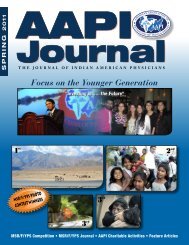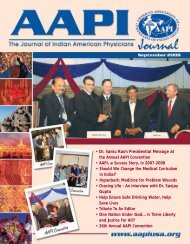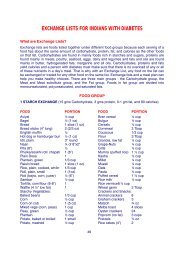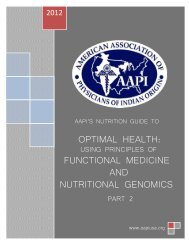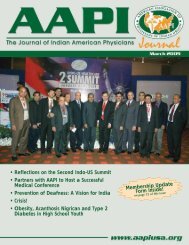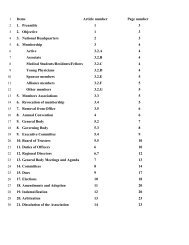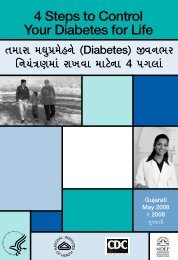functional medicine and nutritional genomics - American Association ...
functional medicine and nutritional genomics - American Association ...
functional medicine and nutritional genomics - American Association ...
Create successful ePaper yourself
Turn your PDF publications into a flip-book with our unique Google optimized e-Paper software.
AAPI’S NUTRITION GUIDE TO OPTIMAL HEALTH: USING PRINCIPLES OF FUNCTIONAL MEDICINE AND NUTRITIONAL GENOMICS<br />
fact, animal research has shown alternate dietary<br />
composition restriction produces benefits to<br />
metabolic health. ApoE*3Leiden mice, considered<br />
to be humanized models for atherosclerosis, were<br />
used to evaluate <strong>and</strong> compare the impacts of 4<br />
diet groups: 1) cholesterol free (CON); 2) high<br />
cholesterol (HC); 3) an alternate regimen of low<br />
cholesterol every other day (ALT); 4) <strong>and</strong> a<br />
daily regimen with cholesterol intake equivalent to<br />
the ALT group (MC). The ALT feeding group<br />
(low cholesterol diet every other day) experienced<br />
most of the beneficial effects of the CON group<br />
(cholesterol free daily); including improvements in<br />
hepatic <strong>and</strong> vascular activation <strong>and</strong> inflammation.<br />
Since this study was a cross-over design,<br />
cholesterol levels of the ALT group were similar to<br />
the HC group during the HC diet, but dropped<br />
rapidly after periods of the CON diet,<br />
demonstrating an adaptive response to dietary<br />
cholesterol intake (i.e., salutogenesis).<br />
Atherosclerosis was reduced by 50% in the ALT<br />
group; however, serum cholesterol was still lower<br />
in the CON group at study end. Serum Amyloid A<br />
(SAA) is a liver-derived inflammation marker, <strong>and</strong><br />
SAA levels in the ALT group were very<br />
comparable to the CON group at study end. NFkappaB,<br />
the inflammatory transcription factor that<br />
controls SAA, showed a 4-fold increase in the<br />
HC group. However, the NF-kappaB levels of the<br />
ALT group were again comparable to the CON<br />
group; whereas the MC group experienced a 3fold<br />
increase. These data demonstrate dietary<br />
cholesterol has adverse effects on the liver, such<br />
as increased inflammation, <strong>and</strong> alternate cholesterol<br />
feeding may reduce or prevent these effects,<br />
particularly in the area of inflammation[29]. The<br />
obvious next step is to replicate this study in<br />
humans to evaluate the realistic effects of these<br />
diet strategies. While alternate day diet restrictions<br />
produce many benefits <strong>and</strong> show physiologic<br />
adaptability to the positive effects of diet<br />
restriction, they are not perfect; but they hold the<br />
promise of greater long-term compliance <strong>and</strong><br />
17<br />
success with lifestyle change strategies; <strong>and</strong><br />
another option for a personalized approach to<br />
hyperlipidemia prevention <strong>and</strong> management.<br />
Gut Health<br />
The microbiome has its own genome to<br />
underst<strong>and</strong>, which needs to adapt to our<br />
environment, which affects human gastrointestinal<br />
health <strong>and</strong> wellbeing. Three million genes are<br />
present in our intestinal microbiome, which is far<br />
greater than the 25,000 genes identified in the<br />
human genome [30]! Microdiversity seems to<br />
equate to resilience <strong>and</strong> salutogenesis with less<br />
microbial diversity seen at old age. An<br />
international comparison of microbiomes was<br />
conducted across continents <strong>and</strong> three enterotypes,<br />
groups of microbiota that seem to co-occur, were<br />
identified. Further research is needed in order to<br />
better elucidate associations between these three<br />
distinct groups <strong>and</strong> clinical <strong>and</strong> biochemical<br />
phenotypes of interest. However, researchers now<br />
have a way of grouping the microbiome data to<br />
underst<strong>and</strong> how these groups may affect diet<br />
response <strong>and</strong> how other environmental factors<br />
interact with these groups to form disease<br />
susceptibility phenotypes[31]. Ultimately, we will<br />
be able to use enteroptype groups in practice to<br />
better underst<strong>and</strong> the health trajectory of our<br />
patients.<br />
There is a complex <strong>and</strong> interesting symbiotic<br />
interplay between food <strong>and</strong> nutrition, our<br />
microbiota, <strong>and</strong> its genes. We feed our microbes<br />
daily with carbohydrates <strong>and</strong>, in turn, our microbes<br />
facilitate our own carbohydrate digestion <strong>and</strong> keep<br />
our gastrointestinal systems functioning properly. In<br />
fact, low carbohydrate intake, including fiber, has<br />
been shown to be detrimental to the colonic<br />
mucosa, decreasing cancer protective metabolites<br />
<strong>and</strong> increasing hazardous metabolite concentrations,<br />
further emphasizing the importance of paying<br />
attention to gastrointestinoal function in<br />
practice[32]. Probiotic supplements <strong>and</strong> probiotic<br />
2012




